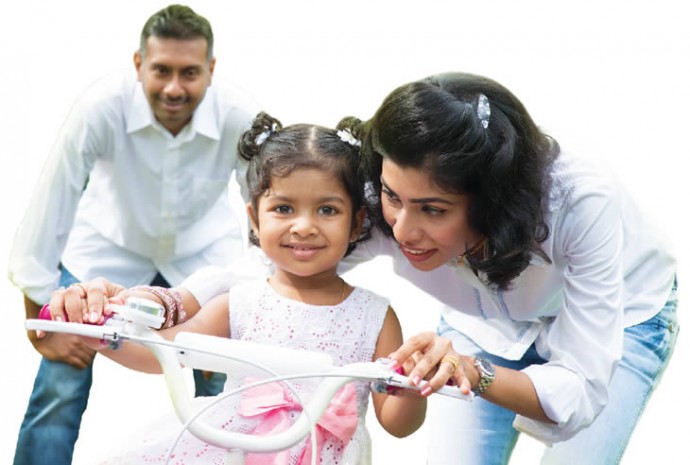Psychosocial wellbeing is important to the healthy development of a child. Children are subjected to stress when they move out from the safe and comfortable environment of their homes. For many children, this experience will begin with leaving home for pre-school. A confident child with healthy self-esteem is able to adapt to the changes and challenges in his life. He will enjoy making new friends, participating in social activities and thrive in a new environment.
What is self-esteem?
It is similar to self-worth (how much a person values himself or herself), developing from infancy and continuing into the adult years. It can be defined as feeling capable while also feeling loved. A child who is happy with an achievement but does not feel loved may eventually experience low self-esteem. Likewise, a child who feels loved but is hesitant about his or her own abilities can also develop low selfesteem. Healthy self-esteem comes when a good balance is maintained.
Body image and self-esteem
Adolescents and young people tend to be extremely conscious about the way they look. Many of them struggle with their selfesteem and body image, especially when they start puberty and are forced to grapple with their changing bodies.
They may start comparing themselves with their peers or media images of celebrities that surround them. The problem is, not everyone grows or develops in the same way, at the same time. Young people may feel bad about their appearances or develop feelings of inadequacy when they compare themselves to media images that are frequently airbrushed to perfection. They may develop unrealistic ideals on what is beautiful or acceptable. All this can affect a young person’s body image and self-esteem as their bodies develop and grow.
Studies have found that overweight or obese children face higher levels of victimisation and have poorer self-esteem. Peer victimisation can take form in overt taunting or bullying, and tend to be more focused on body weight and appearances than any other characteristic. Peer victimisation can also manifest into covert scenarios, such as an overweight or obese child being isolated or side-lined in social settings.
Studies also show that children who are overweight or obese are more likely to become obese adults. This is primarily caused by lifestyle habits such as a poor diet and a lack of physical activity, though genetic predisposition can also contribute to weight problems. Efforts to curb obesity and promote effective weight management must begin from young.
Physical activity and self-esteem
Research shows that regular physical activity is beneficial for children both physically and psychologically. It is associated with an increase in self-esteem and self-concept and a decrease in anxiety and depression. There has also been a lot of attention placed on the link between exercise and mental well-being.
According to a 1986 study on children between the ages of nine and 12 years, self-esteem was found to improve with aerobic exercise, which proves a connection between the two. Other results that have been noted include an elevation in mood state.
In a separate 2009 study on typically sedentary children between the ages of seven and 11 years, it was found that engaging in regular, vigorous aerobic exercise with peers in an organised setting decreased depressive symptoms among overweight children. The emphasis was on intensity, enjoyment, and safety, not competition nor the enhancement of skills.
Activities were selected based on ease of comprehension, fun, and ability to elicit a heart rate greater than 150 beats per minute. Examples of these activities include running games, jumping rope, basketball, and soccer. It was found that increasing the amount of exercise resulted in increased benefits, demonstrating a cause–effect relationship. These findings, along with numerous other studies, reinforce the notion that exercise is successful in enhancing self-esteem.
Laying the foundation for future wellbeing
You can help your child build a healthy sense of self by incorporating exercise into his daily routine. The Malaysian Dietary Guideline (MDG) recommends that children and adolescents be physically active for at least 60 minutes per day. This can be acquired either at one go or accumulated throughout the day.
Exercises should be of moderate intensity and include a wide variety of activities as part of sports, recreation, transportation, chores, work, planned exercise, and school-based physical education classes.
Being physically active can help boost endorphins, a feel-good chemical in the brain that enhances mood and promotes a sense of well-being.
Parents should limit the time their children spend on sedentary activities such as watching television, and playing computer/console games.
Parents play a significant role in inculcating the habit of exercising in children. Remember, physical activity is just a part of the health and wellness equation. Following a healthy and nutritious diet is just as important. Ultimately, a happy and healthy childhood lays a firm foundation for a child’s optimum development and growth.







Comments